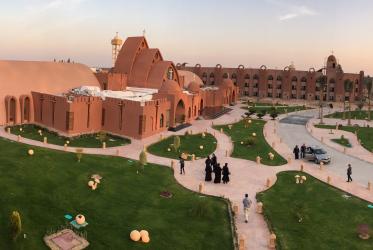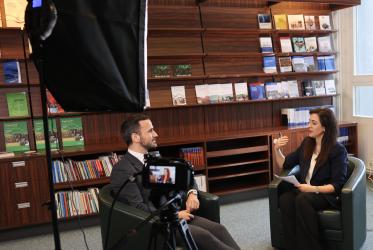At any meeting of the Faith and Order Commission, we always begin by sharing what is happening among the churches and among the people from whom we have come. And it is this place of testimony that is the starting place of our work.
We hear about the wounds of our humanity and we celebrate what God is doing among us - the things that truly mark our lives. We are all theologians, but not so much in the libraries and footnotes kind of way. We do our theology in the midst of life, in all its raw pain and beauty.
I have heard at Faith and Order meetings stories to turn stony hearts into flesh, and to get the most reluctant on their feet to stand up for others. Around our table are people who know what it means to be imprisoned for your faith, those who are giving what little they have to welcome refugees, those who are responding to violence and gangs, those whose people in their poverty are turning to things that will destroy them, those who are trying bravely to speak of the Gospel of Jesus Christ in cynical and secularized cultures, and those who are challenging the economic powers that seem to rule this world. We are, in the most real sense, practical theologians, with urgent concerns from the churches and communities that have sent us.
It is in gatherings like these that The Church: Towards a Common Vision was drafted, discussed, redrafted and re-shaped until, after more than 20 years, we agreed that we have a convergence text. The text came from hands grubby from the dust of daily life, from minds pre-occupied with human suffering, from hearts crying for those in deepest need. It came from those already on a pilgrimage of justice and peace.
There are those who would ask, ‘Why bother to think about ecclesiology.. or any ology at all…when there is so much to be done? What does the unity of the church really have to do with overcoming poverty or making the world a better, more just and peaceful place?’
Our text was first called the ‘nature and purpose’ of the church or later the ‘nature and mission’ of the church. But we have recognized that this is a profoundly false division. It cannot be that some of us think about the nature of the church, while others do what the church is supposed to do. And it’s not that there is something called a church and that it has a mission. Our text says something different. There is God, who has a mission for the world – to heal its brokenness and pain– and God in Christ has called forth the church to join in with this mission of God. To be part of the mission of God we need to be healed ourselves, our own brokenness mended, our own divisions overcome, so that we can be a sign and servant of God’s mission for the world. This is why ecclesiology matters.
The church needs to be renewed and to receive God’s gift of communion so that we can be a witness to this gift in the world. What do we think the church is for but to serve God’s great design for the world, somehow to mirror that loving relatedness in mutual exchange of the blessed and holy Trinity, and to participate in God’s work of healing a broken world? The Church receives the gifts of God and offers those gifts to a wounded and divided humanity. If we are going to offer any such gift, we have to receive it ourselves.
The world cannot wait for the slowness of theologians, you might say. But we are not waiting – we are thinking on the way – seeing the world as it is, reflecting and also acting – putting down words like prayers - for the renewal of the church for us all.
People often say, ‘It’s time we found the unity Christ prayed for.’ At Faith and Order we couldn’t agree more, but we know we won’t find it by ignoring the dividing issues, by failing to name them clearly and being unwilling to debate them and struggle with them, until we find a way through. A pilgrimage works best when we walk beside each other and are honest with each other. Even when we say difficult things we keep walking together, listening deeply to our companions on the way.
Our General Secretary talked on our first day about hope. When we think about the church together we discover a source of hope. We might despair at our human failures to change the world. But the church is not only a human reality – it is God’s creation and it is holy. Our hope in the church rests on our ultimate hope in God, who has created a church to be a sign of good news in the world and a servant of that promise. In the light of that promise we can only feel our hearts surge with hope that we shall be, together, what God has made us to be.
There are people of goodwill all over the world seeking to being justice and peace and the healing of creation. But we have a particular bring to that task. We are church. We sometimes forget what deep traditions and treasures we hold together as part of this one, holy, catholic and apostolic church. We have roots, traditions, wisdom – we have each other to remind us of what we might forget. We have the Gospel and we have the power of God to renew our life and draw us into unity–so that the world might see and believe.
We share the the same landscape as others in the world. But we have a different horizon! And we discover this horizon, and a new vision for God’s world, as we share in the life of the church. That’s why ecclesiology really matters.
Susan Durber



